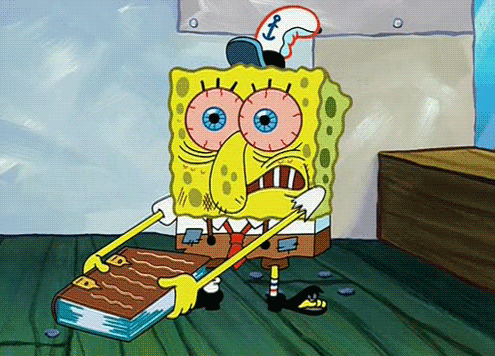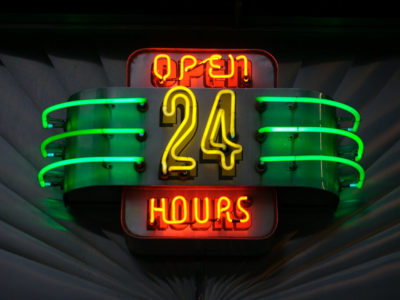A necessary evil for students across the globe, pulling all-nighters is a rite of passage for wide-eyed freshmen and a perfected chore for procrastinating seniors. You’ve managed to revise a binder of highlighted notes and knock out a term paper in a single night, saving valuable time for further procrastination, but that night of fluorescent lighting and Red Bull comes at a cost. Read on to find out why that price isn’t worth paying.
1. It’s Less Effective

Believe it or not, cramming is not the best way to study. It’s time-efficient, sure. When your dorm floor’s flip cup tournament beckons or that new Netflix series calls your name, it’s tough to crack down on the temptations and crack open the books. But, packing a semester of notes into a single night is an extremely ineffective way to learn. According to U.S. News, humans have a tendency to remember the first and last things that we study within a given period, forgetting the details of the stuff in between. As a lot of that “in between” stuff turns out to be pretty important for essays and exams, however, it’s better to spread out your studies over several sessions.
2. No Sleep, No Memory

You’re accustomed to losing several hours of memory after a wild night out, but what about after a long night in? Tomorrow’s big exam has inspired you to forsake your bed for the library, but that all-nighter actually decreases your memory’s functionality. According to the U.S. National Library of Medicine, lack of sleep most significantly impairs working memory, but it also negatively affects long-term memory. When you sleep, your brain takes advantage of the downtime to replenish and refresh itself from the demands of the day. Staying awake to study is like going to soccer practice with a broken ankle; if you don’t allow yourself to heal, you’ll be less effective and, if you keep pushing it, out of commission.
3. Your Grades Will Pay the Price

And that price may be beyond what your poor-college-student-status can afford. Trying to take an exam or write a term paper through the foggy mess that is your brain right now can be a bit tedious and more than a bit ineffective. According to a study done by St. Lawrence University, students who have pulled all-nighters typically have lower GPAs (2.95 average) than those who have not (3.2 average). For those of you who are still a tad groggy from last night’s all-nighter, that gap could determine rejection or acceptance into higher education or nailing or failing that job application.
4. You’ll Have Poor Judgment (Worse Than Usual)

Your hot date with a red solo cup results in more regrets and embarrassing morning-after stories than you care to admit, but that all-nighter can be just as detrimental to your judgment. Your prefrontal cortex serves as that little voice in your head and it won’t work as well with serious sleep deprivation. It’s responsible for making wise decisions and judging situations well, such as telling you “yes, that is smart and may result in cookies” or “no, that will end in pain or minor explosions.” When you’re sleep deprived, your prefrontal cortex suffers and your judgment goes out the window. Pair that with the slap-happy feeling that comes from dopamine overload—or that over-tired euphoric sensation—and you may end up making risky decisions or acting on an over-falsity of confidence. Historically, not awesome.
5. Multi-Tasking is a Not an Option

While knowledge of the material is important for any exam, you’ll also need concentration and the capacity to multi-task, such as being both quick and accurate during your timed assessment. According to Business Insider, without enough sleep, you won’t be able to do either. Your frontal lobe controls spatial, visual and auditory communications. Since that part of your brain is just as exhausted as the rest, a tired frontal lobe renders your attention span caput. Even if you manage to stay alert for your exam, attempting to tackle any other monotonous task, like sitting through that history lecture or dealing with your passive-aggressive roommate, will leave you moody and borderline homicidal.
6. Souped-Up Stress Levels
Waking up on the wrong side of the bed makes anyone cranky. Surpassing your bed entirely isn’t a very good way to fix that problem. Passing up a full night of z’s elevates your body’s cortisol levels which, along with drying out your skin (Beauty sleep is a real thing, you know), also increases stress levels. Also known as the “stress hormone,” cortisol does a wonderful job of forcing you into a ball of impatience and hair-pulling while inducing a general desire to rock back and forth in a corner. Need a better reason to hop into bed? Help Guide reports that as you age, combinations of sleep deficiency and high stress levels increase your chances of suffering a stroke by four.
7. Au Revoir, Healthy Student Lifestyle

College students are the picture of healthy lifestyles: a diet of ramen noodles and pizza (supplemented with copious amounts of beer) and the freedom to spend 20 hours a day tearing through Game of Thrones, rather than heading out for a run secure our spot as the healthiest demographic. Real talk now, we’ve all got room for improvement when it comes to our health. However, pulling that all-nighter is a big step backward. According to Business Insider, the hormones leptin and ghrelin are responsible for regulating our appetites, but sleep deficiency messes with that balance. Lower leptin and heightened ghrelin levels make you hungrier, and less sleep also lowers your insulin levels. Obesity and diabetes are the threats at hand, accompanied by high blood pressure and a suppressed immune system. Best way to avoid the Freshman 15 and the inevitable tide of the campus-wide flu? Go count some sheep.
8. Sleep Deprivation Can Exacerbate Depression

Depression on college campuses is like that mysterious stain on your dorm-room carpet. No one wants to deal with it, but everyone has one in various shades and sizes. Because sleep deprivation hampers your prefrontal lobe, which deals with emotional regulation, the Sleep Foundation reports that pulling regular all-nighters can exacerbate depressive tendencies. College students are particularly susceptible to bouts of depression due to our phase in life: We’re on our own for the first time, saddled with responsibilities, overwhelmed by newfound freedoms and faced with an existential awareness that comes hand-in-hand with higher education.
Depression is not perpetual sadness. That can be a part of it, yes, but it also causes anxiety, hopelessness, loss of interest in activities you once loved, frustration and restlessness, trouble concentrating or remembering things and an overwhelming loss of energy. Not the best line-up for excelling in collegiate academic or social situations. Though there isn’t a quick fix for depression, getting a full night’s rest is a good place to start.



















